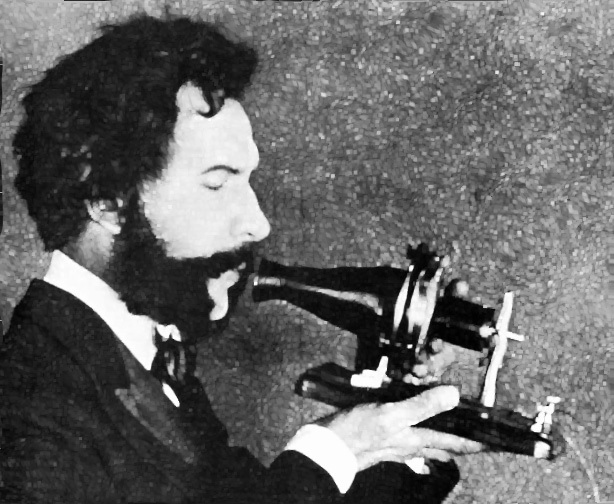Telecom Informer
by The Prophet
Hello, and greetings from the Central Office!
I am writing to you from the tiny suburb of Escazú, Costa Rica, where I am ensconced in a compound two blocks from the U.S. Ambassador's residence. For the past month, I have been busily working with other "future leaders," as we are called, on an internship at a very large U.S.-based bank I will call GinormousBank™. Our top-secret project, which is intentionally being done in faraway Costa Rica: Closing bank offices across the United States and moving the work to low-cost locations like India. This will throw thousands of white collar American workers out of their good, well-paying middle class jobs. It's not just call center jobs being outsourced anymore; these are highly skilled financial industry jobs that require university degrees and years of experience. Many of the people affected, having spent their entire careers at the bank, will never find good-paying work again. It is without a shred of irony that the job title I have been temporarily assigned is "execution support" and I now have a taste of what it must feel like to be an executioner.
Thinking about the current state of the U.S. economy has led me to consider whether there are more sustainable alternatives. The economy in the U.S. simply isn't working for most of the people who are in it. Oregon and the Pacific Northwest are historically left-leaning places with a populist streak and, with an historically small and far-removed population from the rest of the country, these states have experimented a great deal with different ownership structures than the typical shareholder-based corporation. In many Pacific Northwest communities, phone companies are organized differently and operate differently than almost anywhere else in the world, and they might just serve as a model for how to organize other parts of the economy in a more sustainable way.
Although I grew up in the Bell System, I have a soft spot for small independent telephone companies. Across the country, there are hundreds of such companies that continue to provide service in small rural areas. I have covered some aspects of rural telephone companies before, such as the payment of access charges (which is mostly responsible for the large set of free teleconference services offered in Iowa and parts of Louisiana, where access charges are unusually high). I have also covered some of the great lengths to which rural carriers go to provide service in the most remote corners of America. However, I haven't really covered the history of independent telephone companies, or how we can learn from them.
In the early part of the 20th century, most rural areas were not economically feasible for the Bell System to serve. A hodgepodge of small, independent concerns emerged to provide service to areas ignored by the Bell companies. In Eatonville, Washington, the phone company became a multi-generation family-owned business when Pete Christensen won the local telephone switchboard in a 1912 pinochle game. At the time, the phone company had only a small switchboard. Today, the company serves approximately 15,000 customers, has been renamed Rainier Connect, and is still a privately held family business.
Privately held family businesses are vulnerable to being sold, though. Louisiana-based CenturyLink built its business by buying up small phone companies across the U.S., before ultimately taking part of the former Bell System independent by gobbling up Qwest (ex-U.S. West and Pacific Northwest Bell). While most independents sold to other independents, Woodbury Telephone went the other way. Woodbury Telephone was a family-owned company started in the 1870s by a local businessman who wanted to link the town railway station with his farm supply store. The company eventually grew to approximately 19,000 lines of service before it was purchased by Southern New England Telephone (SNET) in 1997. Interestingly enough, SNET was one of the two original parts of the Bell System (along with Cincinnati Bell) that was never majority owned by AT&T. All of that changed in 1998, when SNET was itself acquired by SBC Communications, which was then acquired by AT&T. Woodbury Telephone thus became the only independent operating company that has been fully absorbed by the former Bell System.
Another type of ownership structure for independent telephone companies is the cooperative. Cooperatives are different than other types of organizations because they are owned by their members, who are usually also their customers. If you are a member of a credit union, you probably notice that they have lower fees and pay higher interest on deposits. This is because members are the owners, so profits are returned to members in the form of better and lower-cost services. If you are a member of REI, the dividend check you receive each year is paid because you are part-owner of the cooperative. And in the state of Washington, even a large health maintenance organization (Group Health) is organized as a cooperative. As with other cooperatives, members are owners of the cooperative, and elect the board of directors. Group Health has an incentive to keep its members healthy because this lowers its costs, and its strong emphasis on preventive care (with highly measurable results) is a frequently studied example of the potential for innovative health reform in the U.S.
In all cases, the interests of a cooperative generally differ from those of a corporation. Corporations are organized to produce income and pay dividends to their shareholders, whereas cooperatives are organized to provide the best service to their members at the lowest possible cost. Dividend-paying corporations can earn a profit by providing a useful service - AT&T and Exxon do this every day. However, they are answerable primarily to their shareholders and not their customers. This means that the interests of the two groups can be aligned, but aren't necessarily aligned. This is a big part of why the deferred maintenance backlog in my old Central Office fills two full-size binders and I suspect that a great deal of the trouble reports I filed will never be resolved.
There are about 260 telephone cooperatives in America - many of them in Oregon - and they serve over a million people. Most are in rural areas, originally founded by farmers who had been bypassed by the Bell System. Eventually, interconnection became possible, most often through GTE. GTE gave independent companies access to its tandems and sold them equipment through its Automatic Electric subsidiary. In turn, this gave GTE better economies of scale in equipment production and more leverage in negotiations when interconnecting with the Bell System. Today, telephone cooperatives are organized much as they always have been, with their customers considered members and with the primary mission as customer service. Many telephone cooperatives today offer services that are the envy of urban residents, with fiber to the home, Video-on-Demand cable services, and much lower prices than offered by Comcast or AT&T. With no need to pay dividends, well-run cooperatives have been free to invest their profits into better technology and a wider variety of services. Cooperatives can also operate on a longer-term investment horizon than is typical for investor-owned corporations.
Larger cities, noticing the success stories in areas served by cooperatives, are beginning to get in on the action. More enlightened city governments realize that availability of reliable high-speed broadband is now an American competitiveness issue. Seattle mayor Mike McGinn, embarrassed by the slow and expensive Internet service provided by CenturyLink and Comcast in one of the nation's most high-tech cities, made a big splash recently with his SeaFi initiative. This is a proposed public-private partnership to bring fiber to the home. The cable industry joined forces against Mayor McGinn, made large contributions to his political opponent in the recent mayoral election, and arguably brought down the mayor (who lost the election). The SeaFi initiative now appears headed to defeat as well, although it may be difficult for the new mayor to kill it easily because SeaFi has proven wildly popular with Seattle residents. Other municipal initiatives around the country have been similarly defeated by entrenched interests, from Longmont, Colorado to St. Paul, Minnesota.
Could an old idea from the beginning of the 20th century, if imported to cities from rural areas, revitalize the landscape of American telecommunications? Are cooperatives a better way forward? The answer is a distinct "maybe." After all, not all cooperatives are well-run. And there is nothing like a profit motive to sharpen a company's focus. At the same time, American business has simply gone too far in its cost-cutting, and it's beginning to impact American competitiveness as infrastructure deteriorates. Rotting cables and failing batteries aren't fixed by raising dividends and having someone in India write the problems down (often incorrectly) in a deferred maintenance log. I think the ultimate solution is competition: both public and private systems should freely compete, which will keep both of them honest and ultimately benefit the consumer. Are all CLECs filthy? These days, maybe not.
And with that, it's time for me to get back to my important work at GinormousBank™ destroying the American middle class. If my work is successful, thousands more Americans will lose their jobs and the company may even be able to increase its quarterly dividend payout by up to one cent! Yes, the rewards of business school never end. Have a happy New Year and I'll see you in the spring.
References
- www.seattle.gov/mayor/seafi/gigabittechnicalfaq.htm - SeaFi initiative FAQ
- www.washingtonpost.com/blogs/the-switch/wp/2013/11/06/big-cable-helped-defeat-seattles-mayor-mcginn-but-they-couldnt-stop-this-colorado-project - Washington Post coverage about cable industry efforts to defeat new broadband cooperatives.
- www.rei.com/about-rei/business.html - Information about how the REI co-op is organized.
- en.wikipedia.org/wiki/Woodbury_Telephone - History article about Woodbury Telephone
- www.rainierconnect.com/about-us/history - History of Rainier Connect, a hilarious read!
- www.canbytel.com/about/history - History of the Canby Telephone Association

